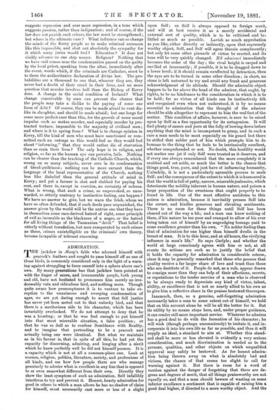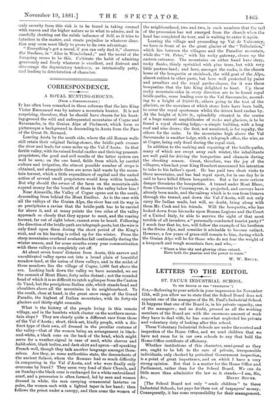ADMIRATION.
THE jackdaw in iEsop's fable who adorned himself with peacock's feathers and sought to pass himself off as one of those birds, is commonly considered only in the light of a warn- ing against struggling to force oneself into a sphere above one's own. By many generations has that jackdaw been pointed at with the finger of scorn, and innumerable people, both young and old, have not hesitated to pronounce him merely an irre- deemably vain and ridiculous bird, and nothing more. Though quite aware how presumptuous it is to venture to take ex- ception to the unanimous and sweeping condemnation of ages, we are yet daring enough to assert that full justice has never yet been meted out to that unlucky bird, and that there is a meritorious side to his character, which has been invariably overlooked. We do not attempt to deny that be was a humbug ; or that he was fool enough to put himself into that most miserable situation, a false position ; or that he was so dull as to confuse Semblance with Reality, and to imagine that pretending to be a peacock and actually being one were identical. But what we maintain as in his favour is, that in spite of all this, he had yet the capacity for discerning, admiring, and longing after a merit which he knew perfectly well he did not himself possess. It is a capacity which is not at all a common-place one. Look at science, religion, politics, literature, society, and professions of all kinds, and see how few people there are who manage genuinely to admire what is excellent in any line that is opposed to or even somewhat different from their own. Directly they show the least symptom of such an admiration, Self infallibly interferes to try and prevent it. Honest, hearty admiration for good in others to which a man allows he has no shadow of claim for himself, must necessarily cast more or less of a slight
upon Self ; so Self is always opposed to foreign merit, and will at best receive it as a merely accidental and external sort of quality, which is to be criticised and be- littled as much as possible. Lavish as much approbation as you like, either directly or indirectly, upon that supremely worthy object, Self, and Self will agree therein complacently; but only let some other pinnacle of virtue be erected, and its tone will be very quickly changed. Nil adrairari immediately becomes the order of the day ; the rival height is carped and cavilled at incessantly ; if possible, it is to be dragged down to a lower level ; if it should remain unaffected by detraction, then the eyes are to be turned in some other direction ; in short, no stone is left unturned to try and avoid any frank and generous acknowledgment of its altitude. Should the admirable object happen to be far above the head of the admirer, that ought, by rights, to be no hindrance to the consideration in which it is to be held ; for as virtue of all kinds can be instinctively felt and recognised even when not understood, it is by no means essential to admiration that the thought of the admirer should be able altogether to represent to him the real fact of the matter. This condition of affairs, however, is sure to be seized upon by Self as a fine opportunity for its antagonism. It will find plenty of sneers and jeers at the folly of bowing down before anything that the mind is incompetent to grasp, and in such a case a man needs to be most especially on his guard lest there be stifled that nobler part of him which prompts him to do homage to the thing that he feels to be intrinsically excellent, whether comprehended or not. No doubt, this hostility would not matter one jot if only Self were treated as it deserves, and if every one always remembered that the more completely it is snubbed and set aside, so much the better is the chance that things good, true, pure, and just have of influencing humanity. Unluckily, it is not a particularly agreeable process to snub Self ; and the consequence of the extent to which it is humoured is that the world is full of petty, narrow, miserable jealousies, which deteriorate the nobility inherent in human nature, and poison a large proportion of the sweetness that ought properly to be found in life. One of the most effective antidotes to this poison is admiration, because it inevitably presses Self into the corner, and kindles generous and elevating sentiments. There is no room for these things until Self has been cleared out of the way a bit; and a man can know nothing of them, if his nature be too poor and cramped to allow of his ever being taken out of himself by an ungrudging homage paid to some excellence greater than his own. " No nobler feeling than that of admiration for one higher than himself dwells in the breast of man. It is to this hour, and at all hours, the vivifying influence in man's life." So says Carlyle ; and whether the world at large consciously agrees with him or not, at all events its actions are such as to justify the belief that it holds the capacity for admiration in considerable esteem, since it may be generally remarked that those who possess that quality receive a far larger share of love and trust than those who are destitute of it. People do not, as a rule, appear drawn to consign more than they can help of their affections, secrets, or reputations to the tender mercies of a man who is observed to be always ready to depreciate any kind of virtue, talent, ability, or excellence that is not so nearly allied to his own as to give him a reflective share in the praises bestowed thereupon.
Inasmuch, then, as a genuine, self-forgetting admiration necessarily takes a man to some extent out of himself, we hold that on this account alone he will be all the better for it. But its utility by no means stops here, and, under proper guidance, it can render still more important service. Whatever be admires has a good deal to do with the formation of his character ; he will wish (though perhaps unconsciously) to imitate it, and in- corporate it into his own life as far as possible, and thus it will supply an ideal, a standard to aim at. Whether this stand- ard shall be more or less elevated is evidently a very serious consideration, and much discrimination is needed as to the persons, qualities, and other objects on which unqualified approval may safely be bestowed. As for honest admira- tion being thrown away on what is absolutely bad and vicious, the chance of that seems too slight to call for warning against it. But there is room for a word of eaution against the danger of forgetting that there are de- grees and degrees of merit, that all things praiseworthy are not equally so, and that a man should beware of wasting on some inferior excellence a sentiment that is capable of raising him a good deal higher, if directed to a more worthy object. And the only security from this risk is to be found in taking counsel with reason and the higher nature as to what to admire, and in -carefully shutting out the subtle influence of Self, as it tries to (interfere in the matter, and create prejudice in whatever direc- tion may seem most likely to prove to its own advantage.
" Everything's got a moral, if you can only find it," observes the Duchess, in "Alice in Wonderland ;" and the moral of the foregoing seems to be this. Cultivate the habit of admiring generously and freely whatever is excellent, and distrust and .discourage the depreciatory tendency, as intrinsically petty, :and leading to deterioration of character.







































 Previous page
Previous page